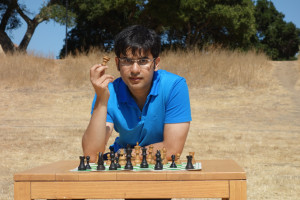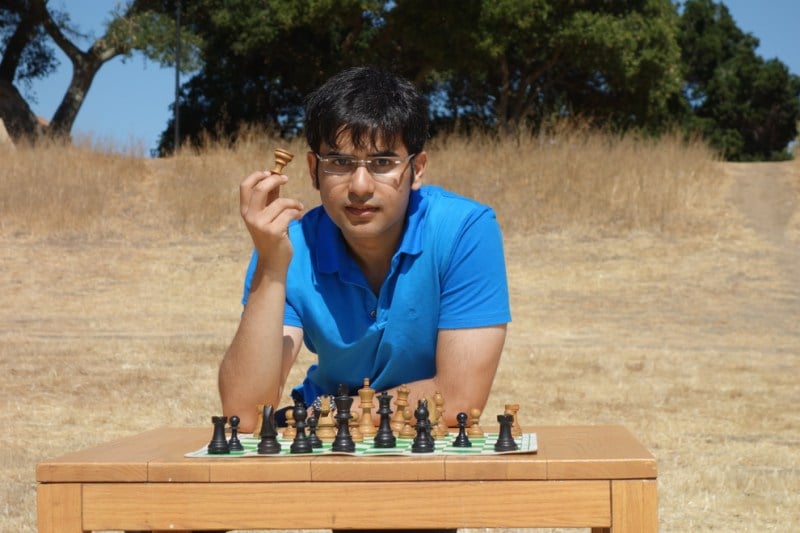
Parimarjan Negi ‘18 holds the title Chess Grandmaster, awarded by the World Chess Federation in 2006 when he was 13 years and four months, beating Magnus Carlsen’s record by a month to become the second-youngest grandmaster ever. After receiving a chessboard when he was five, Negi took on chess as hobby, and then trained seriously — up until now.
Though he is ranked No. 79 in the world, has won many events since 2007 and has written a book, “1.e4 vs. The French, Caro-Kann and Philidor,” Negi is now putting his academic studies first as a freshman at Stanford. On day two of school, Negi sat down for an interview with The Daily to speak about his new start.
The Stanford Daily (TSD): Right now you’re in school, so are you taking a break from chess or are you still playing professionally?
Parimarjan Negi (PN): It’s a break from chess. After I finished high school three years back, I was playing chess very seriously already and I had the options to turn professional, to go to college or just to not take college seriously. Eventually, I decided I did want to take one thing seriously. I took two years of study off just to play chess and to see how I would like it just being a professional, and as it turned out, I didn’t like it as much. There were too many things I wanted to do besides chess. I could sit online and read stuff up, but it’s not really studying at a place like this.
TSD: You said you didn’t like it as much — could you elaborate on that?
PN: Something can be a hobby, but once you’re doing it professional, often you lose that kind of excitement about chess. You’re trying to do such small things to improve slightly, that don’t seem to have any significance. Every point suddenly seems so important and life-changing, but when I took a step back and looked at what I was doing over the last few years, it was the same thing over and over again: one better performance, one slightly bad performance. They had such importance to me, but I don’t think it was really changing me. Playing chess felt a little bit disconnected from reality. There’s a completely different world out there than those squares. You get too absorbed, and you forget there’s an real world with real things going on. I wanted to be more of a part of that, to look at other parts and other interests.
TSD: What are some of your interests that you have in mind?
PN: I didn’t do that much of [calculus], or of computer science, so I’m taking a lot of intro classes right now. But brains fascinate me, especially with all these chess decisions, so that’s why I’m looking at econ, CS, symbolic systems. I’m still not sure where my aptitude would lie. I read a little bit like a layman, but I haven’t really gone in-depth.
TSD: You mentioned the chess decisions — is chess a direct influence on what you are thinking about studying, even if it’s not at the forefront of your life right now?
PN: When I came to Stanford, I wanted a new start. I want to start from the basics and do something completely different — but of course chess has had a huge influence. Often in the world of chess, there are single decisions that will suddenly have huge implications. In five seconds, I could ruin a tournament. There were many thousands of dollars at stake sometimes. Sometimes the decisions would be in my favor; sometimes it would be in the other person’s favor. I had moments when I would freeze up and I wouldn’t know how to decide. There were a lot of psychological battles with myself, with how to perform better. I think that idea of how we make decisions has always fascinated me. That, and the related area of brains. What were the bases for the decisions I’ve made?
TSD: What are some examples and circumstances of particular chess decisions that have weighed on you?
PN: One example that comes to mind is a tournament where I was playing for the title of first prize, $10,000. If I had won that match, I would have had a very good chance of winning that event. It was a high-stress situation. I was very close to winning, a few seconds away, probably. One move — I know that, he knows that. But suddenly I make this absolutely huge blunder that’s for, like, four-year-olds. A complete blackout. A similar situation has happened to me more than once. Those decisions — why, under pressure, I have collapsed? — I don’t know.
TSD: Being under stress and collapsing like that — does that happen to a lot of people who play chess?
PN: It happens of course to a lot of players. But at my level for that game, one of the players, a senior player who has been among the top 50 of the world for a while, said he had never seen a miscarry like that. That was an extreme case perhaps, but on the other hand, there have been moments where I’ve played extremely well under the pressure. Often, playing a good game is not about your skills, but about your mindset that day. You asked earlier how chess has influenced me, and playing a game of chess is a simulated, very controlled version of how life events work. There are ups, downs, moments when you don’t know what’s the best decision and you make a decision on intuition. You always have to move on. I feel like that’s always influenced how I think.
TSD: Can you elaborate on that?
PN: Chess is basically a war game, and that’s how it’s been structured. Every move is a decision. Often you make a mistake, but you have to go on so the mistake doesn’t affect you, so you can continue doing well. Not everyone is able to recover from those mistakes. I wouldn’t say chess helps in areas of the most common sense, but it can help you make a decision without worrying about every consequence, because you realize most of the decisions we make have alternative, for better or worse. We have to make the best out of the current situation. For example, I decided to continue with studies instead of with chess. It’s hard to quantify the decision and analyze it, like this is the monetary value or expense I get, or this is what happens after four years, but that was a decision I made partly on intuition. Now I try to make the best out of this decision, rather than think about what it could have been.
TSD: What about your recent book for Grandmaster Repertoire?
PN: It’s about opening theory, probably the most critical point of the game. Most players prefer not to write books about it because it’s not as financially useful compared to using those ideas yourself and winning tournaments, but since I was coming to college, I realized I wouldn’t be able to use a lot of my ideas, and they get old fast. And it’s some help for my Stanford tuition, of course.
TSD: What do you mean when you say you can’t use them because they get old?
PN: Every time a good idea is played, it gets noticed immediately because it gets put online. The ideas I have right now that are up-to-date, in two years, wouldn’t be because someone else would probably discover or play them. Once someone plays it, everyone knows. I used to play almost every month, but now I might play every couple of months and not as professionally. I’m definitely not going to be able to use a lot of those ideas. If I were to play, [publishing] would be to my disadvantage, and these ideas took many years to develop. But since I feel like it doesn’t have as much value to me anymore, revealing it is hoping it has some value right now, and it can help people. Opening theory is very mismatched. There are some players who are very good at it, some who are very bad at it. It’s useful if these players want to even out that field.
TSD: Do you think you’re ever going to take chess as seriously as you did before?
PN: In chess, my whole career path seemed very laid out for me. Even if there were things for me to improve on, there were the next milestones. And in a way, that felt very boring and restrictive. Here, it feels like there are so many possibilities, and it’s very exhilarating; you get the feeling that you might end up anywhere. Chess is definitely one of the options in “anywhere,” but I wouldn’t say I’m planning to do that. I want this to be a whole new start.
TSD: Is that intimidating at all?
PN: I’m really excited, but of course it’s intimidating. I realize I probably won’t be as good at things as I am at chess. There are people here who have been doing programming or mathematics for many years and they’re obviously very good at it. I’m just building up from the first lessons, so that is somewhat intimidating.
TSD: Nowadays when you’re not playing chess, what do you do?
PN: I still need to get adjusted to the school life. Also, I’ve never really done homework in my life. Maybe when I was 5, or 7, but pretty early on, I started winning tournaments and my school was very happy. They were like, you can win your tournaments, do your training after school so you don’t need to submit your homework. Occasionally I did have to do something but it was so rare I don’t even remember. So…it’s funny but I’m happy to do homework. It’s a new experience.
